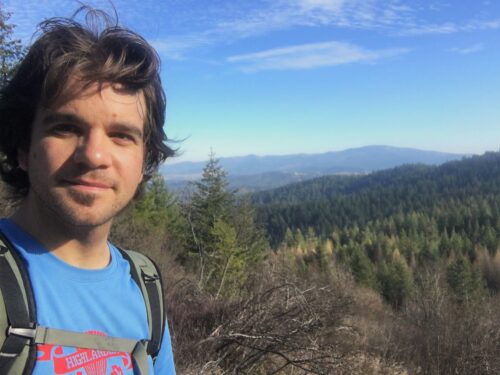#MediaMonday – Scott Leadingham

Scott, time to share:
The last thing journalism needs is more boring white guys. I can’t do much about the latter two traits, but I can try to address the former by not be so boring. So…
I didn’t go to school for journalism, instead jumping from the idea that I’d be an FBI agent to music teacher. Somehow I landed on political science and public policy, maybe because I had an obsession with the letter “P” and its many uses. I don’t know. It was in graduate school when doing a master’s in public affairs that I discovered, much to my chagrin, that “public affairs” had nothing to do with the marital indiscretions of elected officials. Mind you, I came of age during Bill Clinton’s presidency. Public affairs was a hot topic (no pun intended).
This was before Anthony Weiner did whatever the heck Anthony Weiner does and before the world flipped out about tight underwear pictures on Twitter. In other words, “public affairs” was way more substantive than I bargained for. Also, I discovered I didn’t actually want to work in government. The program at Indiana University was really good (look it up if you’re so bored), but the building was also right next to the business school. I heard those guys were making money. Like, WAAAAAY more money than the bureaucrat types being churned out by my program.
But anyone who knows me knows I don’t care for ill-fitting suits and crew cuts. I couldn’t be a business guy. Where could I apply my interest in policy and political processes (again, love of “P”): Journalism.
Of course, that’s the one interest area with less career earning potential than government (I’m conveniently overlooking that previous music teacher thing). I started working with the student newspaper and reporting for the campus radio station on politics and government.
Then I had to graduate and get a job (read: pay back student loans) – BOOOO! – and I found an opportunity to combine the journalism interest with the educational “skills” from the past six years. Hence, a job with the Society of Professional Journalists.
There’s a lot of intervening stuff that you don’t care about and frankly I don’t have the will to regurgitate. If you really care to know (and goodness knows I have no idea why you would) I can fill you in over a tasty adult beverage. (I don’t care for overly hoppy barley soda. Amber. Brown ale. Heffe. Thanks.)
What I’ve learned in the past eight or so years is there’s way more cool stuff going on in journalism than most people – heck, many journalists – know. I’ve said it before and I’ll say it ad infinitum: Now is a really, really, really good time to be in journalism. Yeah, I said it. And it’s a good time to go to school for journalism. Yeah, I know, WTF?
I’ll tell any student this: The number of jobs demanding a journalism skillset have increased exponentially in just the last 10 years. How many “social media editor” positions did news outlets have 10 years ago. None.
Yeah, it’s tough out there. The career outlook for “newspaper reporter” is bleak. Frankly, it sucks big time. But, then again, it’s sucked for a long time if you’re looking to make money and not work major holidays.
Again, journalism is so much more than its constituent parts. If you’re getting into the field thinking you want to be the next Bob Woodward, great. But that’s such an uphill climb you may as well also hope to marry Justin Bieber someday. It’s great to have dreams, but live in reality.
We’re at a moment in time where everyone can be a “news outlet” or disseminator of information, but relatively few people want to accept the responsibility that comes with it. Journalists – the ones who care and take responsibility for the information they share – are still needed. Holy crap are they needed.
Finally, I was asked to share some things I “do when I’m not working.” That’s why that picture isn’t what you’ll see on my Twitter profile nor is it otherwise “professional.” There’s a reason I live in Washington state. There’s tons of stuff to do if you’re the type of person as I am who needs mountains and trees to function. This has the potential to turn into dating site profile, so instead here are five things you must do when you come to the Pacific Northwest:
- Get out of Seattle. It’s awesome. But it’s not representative of what we have in the entire region. Like Arizona, there’s much, much, much more than the Grand Canyon.
- Drive Highway 20 all the way across the state – from the San Juans across the North Cascades, through Winthrop, past Omak, over Sherman Pass and the Kettle Crest, down across the Columbia River and east to Idaho.
- In the spring, hit the desert of Central Washington and the Columbia Basin and see Palouse Falls. Hike down to the bottom. Seriously. Do it. It’s not what you think you’d find in Central Washington.
- Go see Grand Coulee Dam and hike the Candy Point Trail from below the dam to Crown Point Vista above. You think Hoover Dam is big? Yeah, it’s got nothing on Grand Coulee (though I’m a little biased having grown up in the area). In summer, stay for the famed nightly Laser Light Show. Bring a swim suit and hit the beach at Spring Canyon or Steamboat Rock.
- Drive to the Olympic coast and interior of Olympic National Park from the lowland rainforest to the high peaks of the coastal range. Coast. Rainforest. Mountains. All in one park. It’s amazing.
If you’re so inclined or bored, interact on Twitter. But I hope you’re not bored after reading this. Because then I really am just another boring white guy. #LAME

